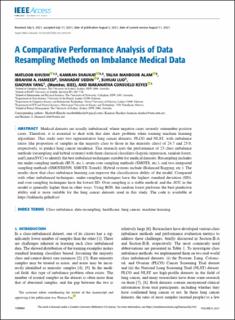A Comparative Performance Analysis of Data Resampling Methods on Imbalance Medical Data
Khushi, Matloob; Shaukat, Kamran; Alam, Talha Mahboob; Hameed, Ibrahim A.; Uddin, Shahadat; Luo, Suhuai; Yang, Xiaoyan; Reyes, Maranatha Consuelo
Peer reviewed, Journal article
Published version

Åpne
Permanent lenke
https://hdl.handle.net/11250/3042589Utgivelsesdato
2021Metadata
Vis full innførselSamlinger
- Institutt for IKT og realfag [600]
- Publikasjoner fra CRIStin - NTNU [38679]
Sammendrag
Medical datasets are usually imbalanced, where negative cases severely outnumber positive cases. Therefore, it is essential to deal with this data skew problem when training machine learning algorithms. This study uses two representative lung cancer datasets, PLCO and NLST, with imbalance ratios (the proportion of samples in the majority class to those in the minority class) of 24.7 and 25.0, respectively, to predict lung cancer incidence. This research uses the performance of 23 class imbalance methods (resampling and hybrid systems) with three classical classifiers (logistic regression, random forest, and LinearSVC) to identify the best imbalance techniques suitable for medical datasets. Resampling includes ten under-sampling methods (RUS, etc.), seven over-sampling methods (SMOTE, etc.), and two integrated sampling methods (SMOTEENN, SMOTE-Tomek). Hybrid systems include (Balanced Bagging, etc.). The results show that class imbalance learning can improve the classification ability of the model. Compared with other imbalanced techniques, under-sampling techniques have the highest standard deviation (SD), and over-sampling techniques have the lowest SD. Over-sampling is a stable method, and the AUC in the model is generally higher than in other ways. Using ROS, the random forest performs the best predictive ability and is more suitable for the lung cancer datasets used in this study. The code is available at https://mkhushi.github.io/.
